第5章 CHAPTER I.(5)
There is no great harm in an old gentleman whistling, but there are two ways of doing it; and as this old beau did it, it seemed not unlike a small cock-a-doodle-doo of general defiance; and the denizens of the green-room, swelled now to a considerable number by the addition of all the ladies and gentlemen who had been killed in the fourth act, or whom the buttery-fingered author could not keep in hand until the fall of the curtain, felt it as such; and so they were not sorry when Mrs.
Woffington, looking up from her epilogue, cast a glance upon the old beau, waited for him, and walked parallel with him on the other side of the room, giving an absurdly exact imitation of his carriage and deportment. To make this more striking, she pulled out of her pocket, after a mock search, a huge paste ring, gazed on it with a ludicrous affectation of simple wonder, stuck it, like Cibber's diamond, on her little finger, and, pursing up her mouth, proceeded to whistle a quick movement, "Which, by some devilish cantrip sleight," played round the old beau's slow movement, without being at variance with it. As for the character of this ladylike performance, it was clear, brilliant, and loud as blacksmith.
The folk laughed; Vane was shocked. "She profanes herself by whistling," thought he. Mr. Cibber was confounded. He appeared to have no idea whence came this sparkling adagio. He looked round, placed his hands to his ears, and left off whistling. So did his musical accomplice.
"Gentlemen," said Cibber, with pathetic gravity, "the wind howls most dismally this evening! I took it for a drunken shoemaker!"
At this there was a roar of laughter, except from Mr. Vane. Peg Woffington laughed as merrily as the others, and showed a set of teeth that were really dazzling; but all in one moment, without the preliminaries an ordinary countenance requires, this laughing Venus pulled a face gloomy beyond conception. Down came her black brows straight as a line, and she cast a look of bitter reproach on all present; resuming her study, as who should say, "Are ye not ashamed to divert a poor girl from her epilogue?" And then she went on, "Mum! mum! mum!" casting off ever and anon resentful glances; and this made the fools laugh again.
The Laureate was now respectfully addressed by one of his admirers, James Quin, the Falstaff of the day, and the rival at this time of Garrick in tragic characters, though the general opinion was, that he could not long maintain a standing against the younger genius and his rising school of art.
Off the stage, James Quin was a character; his eccentricities were three--a humorist, a glutton and an honest man; traits that often caused astonishment and ridicule, especially the last.
"May we not hope for something from Mr. Cibber's pen after so long a silence?"
"No," was the considerate reply. "Who have ye got to play it?"
"Plenty," said Quin; "there's your humble servant, there's--"
"Humility at the head of the list," cried she of the epilogue. "Mum! mum! mum!"
Vane thought this so sharp.
"Garrick, Barry, Macklin, Kitty Clive here at my side, Mrs. Cibber, the best tragic actress I ever saw; and Woffington, who is as good a comedian as you ever saw, sir;" and Quin turned as red as fire.
"Keep your temper, Jemmy," said Mrs. Woffington with a severe accent.
"Mum! mum! mum!"
"You misunderstand my question," replied Cibber, calmly; "I know your _dramatis personae_ but where the devil are your actors?"
Here was a blow.
"The public," said Quin, in some agitation, "would snore if we acted as they did in your time."
"How do you know that, sir?" was the supercilious rejoinder; _"you never tried!"_
Mr. Quin was silenced. Peg Woffington looked off her epilogue.
"Bad as we are," said she coolly, "we might be worse."
Mr. Cibber turned round, slightly raised his eyebrows.
"Indeed!" said he. "Madam!" added he, with a courteous smile, "will you be kind enough to explain to me how you could be worse!"
"If, like a crab, we could go backward!"
At this the auditors tittered; and Mr. Cibber had recourse to his spy-glass.
This gentleman was satirical or insolent, as the case might demand, in three degrees, of which the snuff-box was the comparative, and the spy-glass the superlative. He had learned this on the stage; in annihilating Quin he had just used the snuff weapon, and now he drew his spy-glass upon poor Peggy.